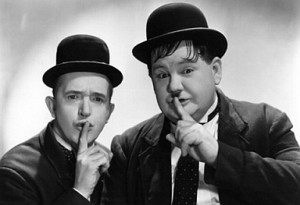 In what may be one of the biggest online troll posts of all time, Anil Dash has come out in favor of texting and talking while watching a movie at the theater. He thinks it is unfair and unrealistic to expect moviegoers to sit quietly when it is much more enjoyable to interact with the movie, fellow audience members, and whoever they want outside the theater. And Hunter Walk suggested that some movie theaters offer wi-fi and brighten the lights so that the audience members can have a rich second-screen experience.
In what may be one of the biggest online troll posts of all time, Anil Dash has come out in favor of texting and talking while watching a movie at the theater. He thinks it is unfair and unrealistic to expect moviegoers to sit quietly when it is much more enjoyable to interact with the movie, fellow audience members, and whoever they want outside the theater. And Hunter Walk suggested that some movie theaters offer wi-fi and brighten the lights so that the audience members can have a rich second-screen experience.
“You can’t make it go away, you cannot stop it, you can’t slow it down, you can’t wish for it to end, you can’t deny them the sheer carnal pleasure of straight up talking through a film. I’m not talking about a quick, quiet aside in a moment of duress during a screening, I’m talking about “Let’s discuss cricket scores!” during the baptism scene in the Godfather….We’re the majority. We’re normal. Your bullying hasn’t worked. The only logical next step is to find a way to accommodate us. Or you could do that thing where you turn around and glare really fiercely—it seems to be working great!”
Dash generously points out that just because texters insist on their right to distract those around them, that does not mean they are encouraging others to do to same. Anyone who does not want to text won’t be forced to do so! Or, perhaps there could be special quiet places like the Alamo Drafthouse for those who want to watch movies without distractions.
Of course, this pretty much rebuts itself, but Slate has a good response on behalf of the people who actually want to enjoy the film without distractions from Aisha Harris. “e argues that because movie theaters are a public space, people should be able to treat it the way they would “any other public space.” Yet in all public spaces, there are standard, agreed-upon rules of etiquette which involve respecting the space and wishes of others around you.”
The best round-up is from Richard Lawson at Atlantic Wire.
Please don’t use your cellphones in movie theaters. That’s all. Because one activity is passive and unobtrusive — sitting quietly and watching what everyone’s there to watch — and the other is active, aggressive even. Dash wants us to feel ashamed for demanding that everyone behave exactly like us, when the real crux of the matter is that everyone mutually agreeing to do nothing but watch the movie is a more reasonable request, in a logical and even factual way, than expecting everyone to just put up with whatever the person next to them wants to do. Dash says the shushers are trying to block out the world, when I think it’s the opposite. Being considerate of those around you — recognizing that they might want to watch a movie in the quiet dark — is an act of communion. Whereas the alternative is basking obliviously in the self-important glow of your telephone.
The presumption should be that people buy tickets to see and hear the movie, not that they buy tickets to have a party while the movie is going on. The people who make movies design them to be seen in the dark, quiet, cathedral-like setting of a movie theater. Yes, people watch them on their phones and on airplanes and while they’re on a treadmill. Maybe someday in a grand blending of movies and games there will be entertainment designed for the kind of interactive experience that requires wi-fi and having the lights on. But the theater is where we get to see movies the way they were meant to be seen. Let’s keep it that way.


